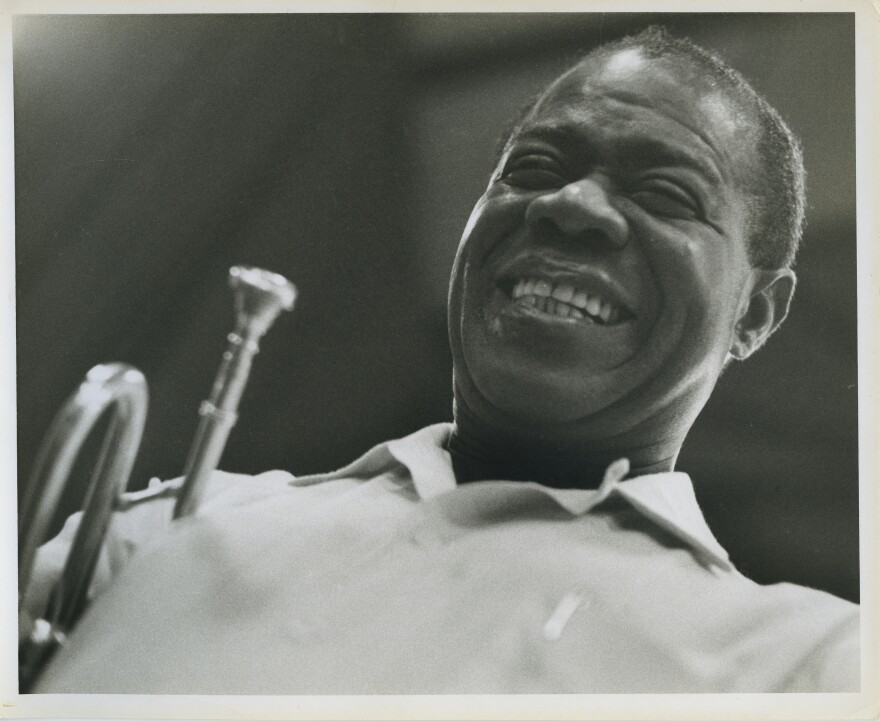Trumpeter Wynton Marsalis and drummer and vocalist Herlin Riley are featured on a buoyant re-imagining of "The Peanut Vendor," available for digital download and at streaming services on Sept. 1. The performance is the first single from A Gift to Pops, the forthcoming Verve Records celebration of Louis Armstrong, featuring The Wonderful World of Louis Armstrong All Stars.
"Louis Armstrong's singing, playing and his interpretations illuminate timeless human fundamentals," Marsalis says in a press statement. "In these trying times, his music and memory is the perfect inspiration for us to rise up and be the very best of ourselves as artists, citizens, and as people."
"The Peanut Vendor" was written by Moisés Simons in the late 1920s. This new version was arranged by multi-instrumentalist Nicholas Payton, one of the new album's three producers. His treatment emphasizes the best of two classic versions while adding a touch of modern New Orleans bounce.
Armstrong first recorded his version of "The Peanut Vendor" for the OKeh label in Dec. 1930. Earlier that year, the tune was on its way to becoming the first million selling record of music by a Cuban composer by way of the Don Azpiazu Orchestra.
Azpiazu's May 1930 version included saxophonist Mario Bauza, and featured vocalist Antonio Machin and trumpet soloist Julio Cueva. Their version cast the song in Simons' original light as a son-pregón, which is an adaptation of a street vendor's cry, buoyed by a clave-driven rhythm inclusive of multiple percussionists.
In the United States during the 1930s, that rhythmic concept was further distilled and became marketed as rhumba. On Armstrong's recording, the pared-down rhythm section of drummer Lionel Hampton, bassist Joe Bailey and pianist and percussionist Henry Prince connect over a steady downbeat. With the absence of multiple hand percussionists, more sonic space is available to Armstrong as he begins his trumpet and scat vocal phrases often in the center of the rhythm only to gradually slow the phrases down towards their natural endings for extra emphasis.
The 2021 version of "The Peanut Vendor" is cast a bit slower than the previous versions, which widens the groove to great effect courtesy of bassist Reginald Veal, pianist Courtney Bryan and Riley. In fact, Riley, in the role of the vendor, gives us a verbal rundown at the top of the tune of his wares for the day, concluding with a declaration that he's "got what [we] need."
Marsalis is immediately responsive as the rhythm section and horns (including saxophonist Roderick Paulin and trombonist Wycliffe Gordon) fall into a hypnotic cadence that provides the trumpeter complete freedom to start and end his solo phrases safely on any beat within the cadence. Echoing his hero Armstrong, Marsalis employs the same technique of beginning his phrases aggressively in tempo, only to later shift gears into more legato statements that fall slightly back on the beat to end the phrase. The group's push and pull over the cadence is a lesson in trust, creativity, and ultimately, service to the groove.
"[Armstrong's] grace, eloquence, intelligence, and naturalness are still showing us how to play and what playing means," Marsalis also says. "Rightfully beloved across the world, he embodied what is best about America."
A Gift to Pops, available on Oct. 15 from Verve Records, is produced by the team of trombonist Wycliffe Gordon, Jackie Harris of the Louis Armstrong Educational Foundation and multi-instrumentalist Nicholas Payton.



